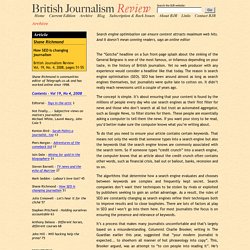

How to Get Your Website Listed in Google News. The How To's Of Writing Content For Your Blog vs. Social Media vs. The Web (Infographic) As the CEO of a small business, you are undeniably wearing multiple hats and deciphering your marketing strategy is just one of them.

Today, regardless of the size of your business, you need to reach out to clients beyond the brick and mortar via emails, social media, websites, blogs and professional networks, with the style of communicating being markedly different across these channels. VerticalResponse, an all-in-one provider of marketing solutions has prepared what it cheekily calls the ‘Copywriting Cheat Sheet’. It’s an info-graphic on how the text, length and pace of the copywriting should be attuned as per the internet tool used, to make that all important customer impact. Email Promotions & Newsletters - Email-marketing is one of the most effective methods to sell your product / service over the internet. So before you embark on an email campaign, be very clear who your customer is and the relevance of your message at that point of time.
10 Tips To Keep Visitors 20 Seconds. Top Ten SEO Tips For Journalists. Are you making the most of SEO?

(Pic: Javi) By Tom Etherington It wasn’t until the end of my second year at University that I decided to learn more about Search Engine Optimisation (SEO) and its importance to online journalism. The practice of SEO, in case you’re unfamiliar with the term, is to improve a website or web page’s visibility and rankings in search engines like Google, Yahoo! And Bing. However, some modern classrooms and newsrooms still do not recognise the importance of SEO and many journalists are relying on outdated training as there have been dramatic changes during the past few years.
Here are some useful Search Engine Optimisation tips for journalists: 1) Use related keywords Keywords are the various phrases that people type into search engines, ranging from “local election results” to “Kim Kardashian wedding”. 2) Avoid jargon The most effective way of covering as many keywords as possible, without overdoing things, is by avoiding complicated language and jargon. SEO What? (SEO and Journalism) SEO for journalists: Why is it important?
A journalist’s guide to SEO. How SEO is changing journalism, Shane Richmond - British Journalism Review Vol. 19, No. 4, 2008. Search engine optimisation can ensure content attracts maximum web hits.

And it doesn’t mean conning readers, says an online editor The “Gotcha” headline on a Sun front-page splash about the sinking of the General Belgrano is one of the most famous, or infamous depending on your taste, in the history of British journalism. Yet no web producer with any experience would consider a headline like that today. The reason is search engine optimisation (SEO). SEO has been around almost as long as search engines themselves, but journalists were quite late to cotton on. The concept is simple. To do that you need to ensure your article contains certain keywords. The algorithms that determine how a search engine evaluates and chooses between keywords are complex and frequently kept secret. It’s a process that makes many journalists uncomfortable and that’s largely based on a misunderstanding. Let’s go back to May 4, 1982 and that “Gotcha” headline. A guide to SEO for editorial teams and journalists.
SEO for editorial teams – a step-by-step process putting quality editorial first - with Wordtracker, the leading keyword research tools In this first of a two-part guide to SEO for editorial teams and journalists, Mark Nunney introduces editors to the basics of SEO and gives a step-by-step process that puts editorial at the heart of your SEO.
Editorial teams are often put into the front line of SEO. That’s quite right because editorial is the front line of SEO. Of course there are important technical aspects to SEO involving code, URLs, redirects, robots files, rel canonicals and the like. And many SEOs are techies by background so this side of SEO continues to get much emphasis. But all that technical business is a bit like the mechanical work on a racing car.